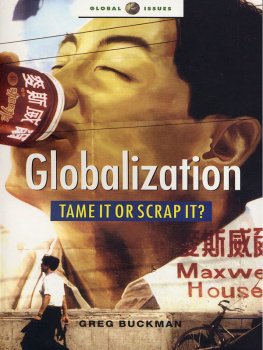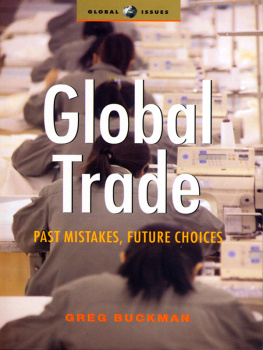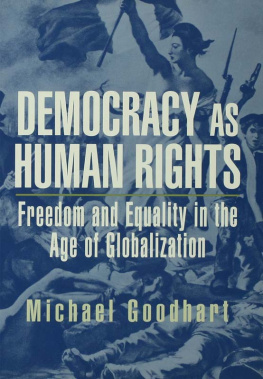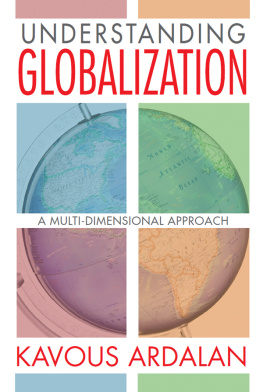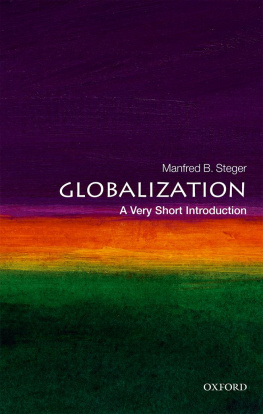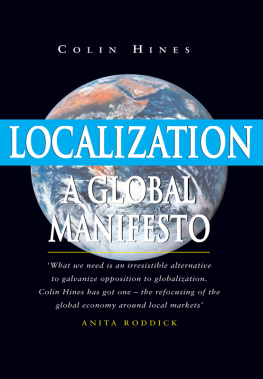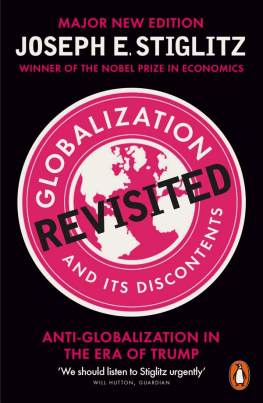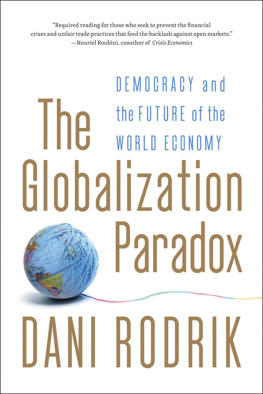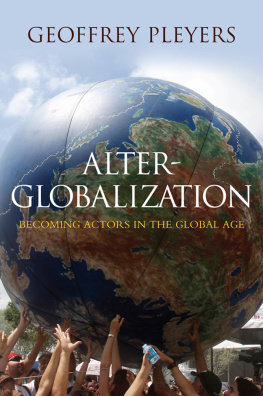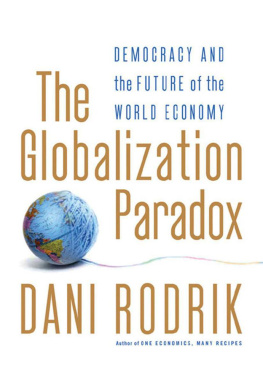
ABOUT THIS BOOK
Globalization is irreversible and irresistible.
TONY BLAIR
This book gives the lie to that claim. Greg Buckman argues that economic globalization has never been an inevitable part of human history. This is persuasively articulated in the first half of the book, where a readable and readily comprehensible overview is provided of how globalization came about. Globalization is eminently reversible and hugely resistible as Buckman shows in the second half of the book, where he introduces and explains the alternatives of the anti-globalization movement.
Buckman argues there are two broad policy approaches within the anti-globalization movement. One, perhaps the most widely supported and influential strand today, he calls the Fair Trade/Back-to-Bretton-Woods school. This is a moderate school that argues for immediate reform of the worlds trading system, capital markets and global institutions, notably the World Bank, IMF and WTO. The other school, an equally broad church, advocates Localization, taking a more radical root-and-branch position that argues for the abolition of these institutions and an outright winding back of economic globalization. Buckman explains the details of each schools outlook and proposals, the criticisms that can be made of them, where they disagree among themselves, and perhaps most importantly where they share common ground and can come together in their campaigning.
This book attempts to give an informed hope to those dedicated to resisting and reversing economic globalization, a hope based on real and viable positive alternatives.
CRITICAL PRAISE FOR THIS BOOK
So refreshing and useful to read a book that goes beyond the usual bleatings about the problems of globalization in order to analyse in detail the alternatives that are at last emerging.
COLIN HINES, author of
Localization: A Global Manifesto
Greg Buckman has done the global justice movement a valuable service in clearly outlining the major debates around taming versus scrapping globalization, and then attempting to find common ground. I urge everyone who wants a fairer, safer and more sustainable world to read this book.
ROD DONALD MP, Co-leader,
Green Party of Aotearoa New Zealand
Greg Buckmans work opens up the all-important debate between the ideas of localization and fair trade, on the one hand, and economic globalization, on the other.
SENATOR BOB BROWN,
leader of the Australian Greens
The clearest and most succinct explanation of the origins and processes of economic globalization yet to appear in English, plus the best coverage of the debates over what to do about it. A useful tool for anti-globalization activists everywhere.
CHRISTINE DANN
GLOBALIZATION: TAME IT OR SCRAP IT?
Mapping the Alternatives of the Anti-globalization Movement
GREG BUCKMAN
University Press
Dhaka
White Lotus
Bangkok
Fernwood Publishing
Nova Scotia
Books for Change
Bangalore
SIRD
Kuala Lumpur
David Philip
Cape Town
ZED BOOKS
London & New York
Globalization: Tame It or Scrap It? was first published in 2004 by
In Bangladesh: The University Press Ltd,
Red Crescent Building, 114 Motijheel C/A, PO Box 2611, Dhaka 1000
In Burma, Cambodia, Laos, Thailand and Vietnam:
White Lotus Co. Ltd, GPO Box 1141, Bangkok 10501, Thailand
In Canada: Fernwood Publishing Ltd,
8422 St Margarets Bay Road (Hwy 3) Site 2A, Box 5,
Black Point, Nova Scotia, BOJ IBO
In India: Books for Change,
139 Richmond Road, Bangalore 560 025
In Malaysia: Strategic Information Research Development (SIRD),
No. 11/4E, Petaling Jaya, 46200 Selangor
In Southern Africa: David Philip (an imprint of New Africa Books),
99 Garfield Road, Claremont 7700, South Africa
In the rest of the world: Zed Books Ltd, 7 Cynthia Street, London N1 9JF,
UK, and Room 400, 175 Fifth Avenue, New York, NY 10010, USA
This ebook edition was first published in 2013
www.zedbooks.co.uk
Copyright Greg Buckman 2004
The right of Greg Buckman to be identified as the author of this work has been asserted by him in accordance with the Copyright, Designs and Patents Act, 1988
Designed and typeset in Monotype Bembo by Illuminati, Grosmont Cover designed by Andrew Corbett
AH rights reserved
A catalogue record for this book is available from the British Library
Library of Congress Cataloging-in-Publication Data available
Canadian CIP data is available from the National Library of Canada
ISBN 978 1 84813 694 6
CONTENTS
LIST OF TABLES, FIGURES AND BOXES
ABOUT THE AUTHOR
GREG BUCKMAN is a former national finance manager for the Wilderness Society of Australia. Currently treasurer of the Australian Greens, he has also been co-editor of their magazine, Green. He has undertaken much economic research, particularly on issues concerning globalization, forestry and energy. His long involvement with the environmental movement goes back to the successful international fight to save the Franklin river in Tasmania in the early 1980s.
To Derek Brown, whose idealism lives on
PART 1
THE EVOLUTION AND CONSEQUENCES OF ECONOMIC GLOBALIZATION
CHAPTER I
INTRODUCTION
Every era has its defining influences. In the post-Second World War decades of the 1950s, 1960s and 1970s it was technology. The world then was either awestruck or horrified by Sputnik, the moon landing, the Aswan Dam, the green (fertilizer) revolution, the Thalidomide scare, the birth-control pill and mainframe computers.
In the 1980s, the 1990s and the present decade, the defining influence is money particularly global money. Weve become familiar with the Nasdaq and the Dow Jones indexes. Everyone knows what Enron is. Most of us have a pretty good idea what the latest national exchange rate is or what the daily spot prices for oil and gold are. Weve seen the Asian meltdown of 1997, the Argentinian collapse of 2002 and the post-September 11 stock-market gyrations played out on our television screens. Theres no escaping the all-pervading influence of economic globalization. We are all caught up in it now.
This book holds a mirror to the face of economic globalization. It charts the rise and negative consequences of economic globalization and profiles the policy responses of the anti-globalization movement, which, like the Nasdaq and Dow Jones indexes, has become ubiquitous, particularly since the Battle for Seattle protests of 1999.
The anti-globalization movement is a very broad church which takes in activists concerned with nonviolence, feminism, poverty, the rights of indigenous people, the rights of the unemployed, preservation of the environment and responsible media, to name just a few issues. This book concentrates exclusively on economic globalization. Economic globalization is necessarily connected to all the myriad issues covered by the anti-globalization movement but it deserves specific attention. It is the dominant influence behind many of the worlds present-day ills and needs to be examined in its own right. This does not mean the other issues covered by the anti-globalization movement are not important; they are important, but for the purposes of understanding and reasoned response it is necessary to pull the globalization machine apart and specifically examine its economic parts.
Many would have you believe that economic globalization is the product of an inevitable rightward swing in politics over the past few decades. Others say it is the predictable consequence of the march of technology. Many in the anti-globalization movement say it is the product of the irrepressible greed of transnational corporations. In reality it is the result of all these things, and more. It is the convergence of many haphazard and planned influences. As a result this book tries to avoid pigeon-holing economic globalization, and its origins, into neat boxes, and instead tries to take a holistic overview of its various defining influences and consequences.
Next page
